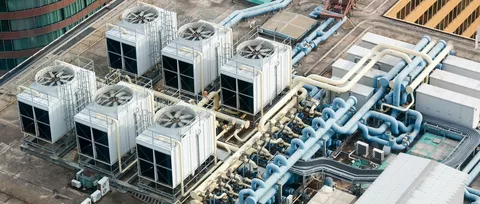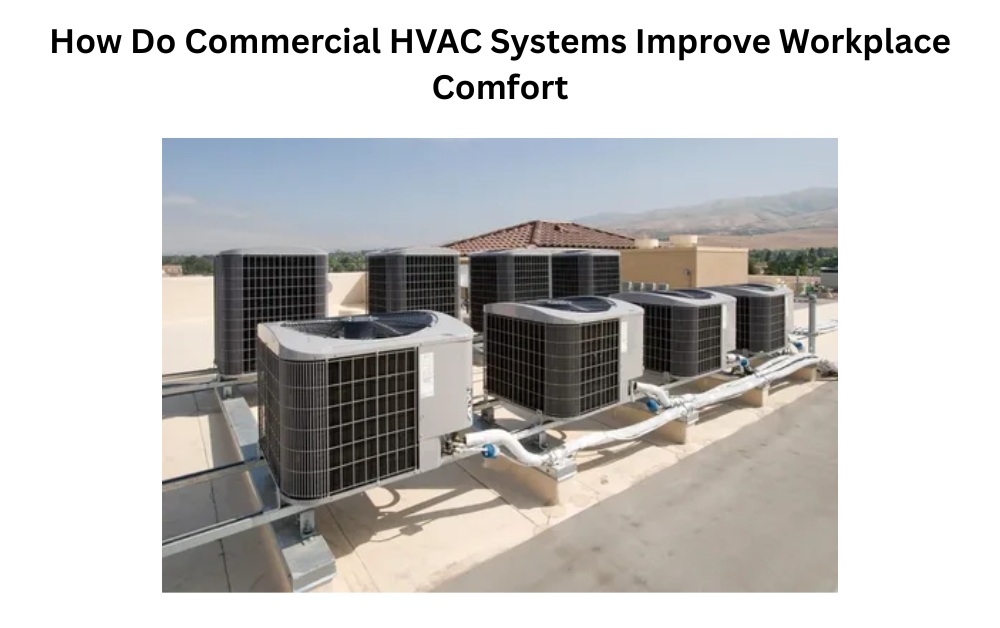A comfortable workplace is essential for productivity, employee satisfaction, and overall business efficiency. One of the key factors that influence comfort in offices, factories, retail spaces, and other commercial environments is the heating, ventilation, and air conditioning system, commonly known as HVAC.
Commercial HVAC systems are designed to provide the right temperature, humidity, and air quality across large areas, ensuring that employees and visitors feel comfortable throughout the day. In this article, we will explore how commercial HVAC systems improve workplace comfort and why investing in a professional system is crucial for every business.
Understanding Commercial HVAC Systems

Commercial HVAC systems are more complex than residential systems because they serve larger areas and often need to manage multiple zones with different temperature and air quality requirements.
Components of a Commercial HVAC System
A commercial HVAC system typically includes the following components:
- Heating units – Furnaces, boilers, or heat pumps that provide warmth during colder months.
- Cooling units – Air conditioners and chillers that cool the building during hot weather.
- Ventilation systems – Ductwork, fans, and air exchangers that circulate fresh air and remove stale air.
- Air filtration – Filters and purifiers that remove dust, allergens, and other particles from the air.
- Control systems – Thermostats and smart controls that regulate temperature, humidity, and airflow.
These components work together to maintain a comfortable, safe, and healthy workplace environment.
Differences Between Commercial and Residential HVAC
While residential HVAC systems serve a single home, commercial systems handle large spaces, higher occupancy, and more complex heating and cooling needs. Commercial systems are designed for:
- Multiple floors or zones
- High occupancy areas like offices or shopping malls
- Continuous operation throughout the day
- Integration with building management systems for efficiency
Understanding these differences helps businesses choose the right HVAC system for their specific workplace needs.
How Commercial HVAC Systems Enhance Temperature Control
Temperature is one of the most important factors in workplace comfort. A building that is too hot or too cold can affect employee productivity and satisfaction.
Maintaining Consistent Temperature
Commercial HVAC systems are designed to maintain consistent temperatures across different areas of the building. Advanced zoning systems allow different floors or rooms to have separate temperature settings based on their usage.
- Offices may require cooler temperatures for computers and equipment.
- Meeting rooms may need slightly warmer temperatures for comfort during long discussions.
- Manufacturing or storage areas may have specific temperature requirements to protect products.
Adjusting for Seasonal Changes
Professional HVAC systems automatically adjust to seasonal temperature changes, providing heating in winter and cooling in summer. This ensures that employees remain comfortable all year round without manual adjustments.
Reducing Hot and Cold Spots
Uneven heating or cooling can create discomfort in workplaces. Properly designed commercial HVAC systems distribute air evenly, eliminating hot or cold spots and creating a uniform working environment.
Improving Indoor Air Quality
Good air quality is critical for employee health, comfort, and productivity. Commercial HVAC systems play a major role in keeping indoor air clean.
Removing Contaminants
Air filters in commercial HVAC systems trap dust, pollen, smoke, and other particles. Some advanced systems also remove bacteria and viruses, reducing the risk of illness in the workplace.
Proper Ventilation
Ventilation systems bring in fresh outdoor air and remove stale indoor air. This prevents stuffiness, odors, and accumulation of harmful gases such as carbon dioxide.
Controlling Humidity
Humidity affects both comfort and health. High humidity can make a space feel sticky and increase mold growth, while low humidity can dry out skin and respiratory passages. Commercial HVAC systems control humidity levels, ensuring a comfortable and safe indoor environment.
Noise Reduction and Workplace Comfort
Noise can significantly affect employee focus and productivity. Commercial HVAC systems are designed to operate quietly, reducing disturbances in the workplace.
Low-Noise Equipment
Modern HVAC units are built to minimize operational noise. Fans, compressors, and air handlers are engineered for quiet performance, especially in office or conference areas where silence is important.
Sound-Reducing Ductwork
Special duct designs and insulation help reduce vibrations and airflow noise, contributing to a more peaceful workplace environment.
Energy Efficiency and Comfort
Energy-efficient HVAC systems not only save money but also contribute to a more comfortable workplace.
Smart Controls and Thermostats
Advanced commercial HVAC systems often include smart controls that adjust temperature and airflow based on occupancy, time of day, and outside weather conditions. This ensures comfort while reducing energy wastage.
Zoning Systems
Zoning systems allow different areas to be heated or cooled independently. For example, a conference room can be cooled while a storage area remains at a different temperature. This targeted approach improves comfort and efficiency.
Reduced Environmental Impact
Energy-efficient HVAC systems consume less electricity or gas, reducing the building’s carbon footprint. Businesses can maintain comfortable workplaces while contributing to sustainability goals.
Custom Solutions for Different Workplaces
Each workplace has unique requirements, and commercial HVAC systems can be customized to meet them.
Office Buildings
In offices, comfort is essential for productivity. HVAC systems ensure proper temperature, humidity, and air quality, allowing employees to work efficiently.
Retail Spaces
Shops and malls require consistent cooling and heating for customer comfort. HVAC systems also help maintain a pleasant shopping experience by controlling humidity and air freshness.
Industrial Facilities
Factories and warehouses may need specialized HVAC solutions to manage heat from machinery, control dust and fumes, and protect sensitive products.
Healthcare Facilities
Hospitals and clinics require precise temperature control, humidity regulation, and advanced air filtration to ensure patient safety and comfort.
Maintenance and Service for Continuous Comfort
Regular maintenance is crucial for commercial HVAC systems to perform efficiently and provide consistent comfort.
Scheduled Inspections
Professional service providers conduct regular inspections to check system performance, clean filters, and ensure that all components are functioning properly.
Preventive Maintenance
Preventive maintenance helps detect potential problems early, preventing breakdowns and costly repairs.
Emergency Repairs
A reliable HVAC service ensures that any unexpected issues are resolved quickly, minimizing downtime and discomfort in the workplace.
Choosing the Right Commercial HVAC System
Selecting the right system is essential for workplace comfort. Consider the following factors:
System Size and Capacity
The system should match the building’s size, layout, and occupancy. An undersized system cannot maintain comfort, while an oversized system wastes energy.
Type of HVAC System
Common commercial systems include rooftop units, split systems, and variable refrigerant flow (VRF) systems. Each type has specific advantages depending on the building’s needs.
Professional Installation
Proper installation is critical. Certified technicians ensure that the system is installed correctly, ducts are sealed, and equipment is calibrated for optimal performance.
Energy Efficiency Ratings
Look for systems with high energy efficiency ratings to save costs and reduce environmental impact.
Benefits of a Well-Designed Commercial HVAC System
A professionally designed and installed HVAC system offers multiple benefits for workplaces:
- Comfortable working environment – Consistent temperature, humidity, and airflow improve employee satisfaction.
- Higher productivity – Comfortable employees are more focused and efficient.
- Lower energy costs – Energy-efficient systems reduce electricity and gas bills.
- Healthier workplace – Clean air and proper ventilation reduce illness and allergies.
- Longer equipment lifespan – Regular maintenance and proper installation extend the system’s life.
Conclusion
Commercial HVAC systems play a vital role in creating a comfortable, healthy, and productive workplace. They control temperature, humidity, air quality, and noise, ensuring that employees and customers feel comfortable throughout the day.
Investing in a high-quality commercial HVAC system, installed and maintained by professionals, offers long-term benefits including energy savings, improved employee satisfaction, and a healthier work environment.
From offices and retail spaces to factories and healthcare facilities, every workplace can benefit from a well-designed commercial HVAC system. Choosing the right system and maintaining it properly ensures that your workplace remains comfortable, efficient, and safe all year round.
CBE Gulf offers expert MEP, HVAC, and facility management services in Dubai. Trusted electromechanical contractors for sustainable and smart building solutions. Contact us today for a free consultation.
For more insightful articles related to this topic, feel free to visit: writoka.com



